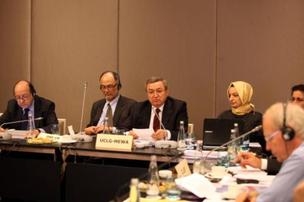
|
| The Global Task Force meeting in Istanbul, March 2013. Photo: UCLG |
[25 March 2013] -- With the Millennium Development Goals due to expire in 2015 and Habitat II coming up in 2016, a debate is currently underway to determine what the next set of development goals should be. United Cities and Local Governments (UCLG) has formed a task force of its members and partners that aims to develop a joint strategy to ensure that the views of local and regional governments are represented in the new development agenda.
The Global Task Force of Local and Regional Governments for Post-2015 and Habitat III held its second meeting in Istanbul, Turkey 19-20 March 2013. As a partner and supporter of the Task Force, the Cities Alliance was represented at the event by Urban Specialist Dr. Rene Peter Hohmann.
The meeting concluded with the adoption of a joint communiqué outlining priorities for a new development agenda. The communiqué stressed that the new development agenda should be people-centred and acknowledge local and regional governments as key actors in development.
It highlighted several areas that should become an integral part of the new global agenda:
- Democratic self-governing, participative, efficient, accountable and resourced Local and Regional Government within the framework of a better intergovernmental coordination, harmonisation processes and effective decentralisation
- Food Security and Nutrition as basis for poverty eradication
- Quality Universal Basic Service Provision geared towards reducing inequalities and improving the lives of slum dwellers, including a gender sensitive approach. These services should foster inclusive societies that are mindful of providing opportunities for youth.
- Local Economic Development, with a focus on pro-poor policies and decent job creation in a green urban economy which promotes sustainable consumption and production
- Sustainable Urbanisation as source of development: Cities that are well planned, designed and governed can generate economic growth and means of livelihood. This includes a territorial approach and cohesion, with special attention to climate change mitigation and adaptation, risk prevention and safe cities.
- Culture as driver and enabler of development and people-centreed societies.
- Protection and sustainable management of the environment, biodiversity and natural resources
- Local Government Development Cooperation (Decentralised Cooperation) as an instrument to promote solidarity and peer learning




